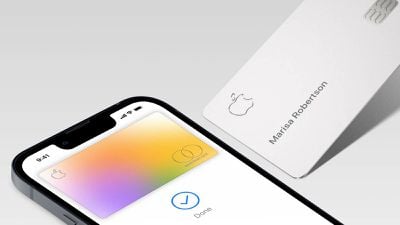Apple Card Launched Three Years Ago, Remains Exclusive to U.S. Residents
This month marks three years since the Apple Card launched in the United States. Apple's credit card first rolled out to a limited number of customers on August 6, 2019 before expanding to all eligible U.S. residents two weeks later.

Unfortunately for iPhone users living in other countries, however, the Apple Card has still yet to launch outside of the United States.
One country where the Apple Card would especially make sense is Canada, where the iPhone has over 50% market share and 76.2 million Visa and Mastercard cards were in circulation as of January 2021, according to the Canadian Bankers Association. Apple Card's standard 2% cashback on purchases made via Apple Pay and 3% cashback at participating merchants would be competitive with other Canadian credit cards, but it's likely that the Apple Card's rewards would vary on a country-by-country basis.
During a trip to Germany in 2019, Apple CEO Tim Cook said that Apple was open to offering its credit card in additional countries, but he noted that banks and regulations vary around the world. Last year, the Apple Card trademark was approved in Canada, but Apple has yet to announce any plans to expand the card internationally.
Launched in partnership with investment bank Goldman Sachs and Mastercard, the Apple Card can be managed completely through the Wallet app on an iPhone or Apple Watch, with key features including color-coded spending summaries, cashback paid out on a daily basis, an interest-free financing option for purchasing new Apple products, and no fees of any kind beyond interest charges on overdue balances. There is also a physical Apple Card available for use at stores that do not accept contactless payments.
Popular Stories
Apple is preparing a "bold" new iPhone Pro model for the iPhone's 20th anniversary in 2027, according to Bloomberg's Mark Gurman. As part of what's being described as a "major shake-up," Apple is said to be developing a design that makes more extensive use of glass – and this could point directly to the display itself.
Here's the case for Apple releasing a truly all-screen iPhone with no...
While the iPhone 17 Pro and iPhone 17 Pro Max are not expected to launch until September, there are already plenty of rumors about the devices.
Below, we recap key changes rumored for the iPhone 17 Pro models as of April 2025:
Aluminum frame: iPhone 17 Pro models are rumored to have an aluminum frame, whereas the iPhone 15 Pro and iPhone 16 Pro models have a titanium frame, and the iPhone ...
The first iOS 19 beta is less than two months away, and there are already a handful of new features that are expected with the update.
Apple should release the first iOS 19 beta to developers immediately following the WWDC 2025 keynote, which is scheduled for Monday, June 9. Following beta testing, the update should be released to the general public in September.
Below, we recap the key...
If you have been experiencing issues with wireless CarPlay in your vehicle lately, it was likely due to a software bug that has now been fixed.
Apple released iOS 18.4.1 today, and the update's release notes say it "addresses a rare issue that prevents wireless CarPlay connection in certain vehicles."
If wireless CarPlay was acting up for you, updating your iPhone to iOS 18.4.1 should...
Apple's iPhone development roadmap runs several years into the future and the company is continually working with suppliers on several successive iPhone models simultaneously, which is why we often get rumored features months ahead of launch. The iPhone 17 series is no different, and we already have a good idea of what to expect from Apple's 2025 smartphone lineup.
If you skipped the iPhone...
Apple may have updated several iPads and Macs late last year and early this year, but there are still multiple new devices that we're looking forward to seeing in 2025. Most will come in September or October, but there could be a few surprises before then.
We've rounded up a list of everything that we're still waiting to see from Apple in 2025.
iPhone 17, 17 Air, and 17 Pro - We get...
Apple today released iOS 18.4.1 and iPadOS 18.4.1, minor updates to the iOS 18 and iPadOS 18 operating systems that came out last September. iOS 18.4.1 and iPadOS 18.4.1 come two weeks after the launch of iOS 18.4 and iPadOS 18.4.
The new software can be downloaded on eligible iPhones and iPads over-the-air by going to Settings > General > Software Update.
There have been complaints about ...
Apple today updated its vintage products list to add the 2018 Mac mini and the iPhone 6s, devices that will get more limited service and repairs now that they are considered vintage.
The iPhone 6s initially launched in 2015, but Apple kept it around as a low-cost device until 2018, which is why it is only now being added to the vintage list. The iPhone 6s had Apple's A9 chip, and it was...
Apple today released macOS Sequoia 15.4.1, a minor update to the macOS Sequoia operating system that launched in September. macOS Sequoia 15.4.1 comes two weeks after the launch of macOS Sequoia 15.4.
Mac users can download the macOS Sequoia update through the Software Update section of System Settings. It is available for free on all Macs able to run macOS 15.
According to...

























